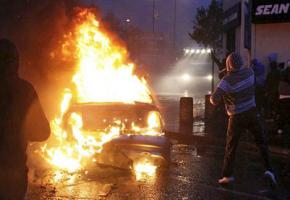Northern Ireland’s strange peace
Activist , the co-host of Radio Free Eireann on WBAI in New York City, explains the sources of growing political and social conflicts in Northern Ireland.
THERE IS an establishment myth that there is peace in Northern Ireland. The conflict was proclaimed over in 1998. The Irish Republican Army (IRA) abandoned its war, and the British and Irish governments and Northern Ireland political parties signed the Good Friday Agreement. It established a local government, including both Catholic and Protestant parties.
Since 2006, Sinn Fein, which used to be described as the political wing of the IRA, and Ian Paisley's Democratic Unionist Party have collaborated in a Northern Ireland Executive with limited power.
Yet today, there are daily attacks on the security forces--the police, British army and even the British intelligence service MI5. Some are carried out by so-called "dissident" Republicans who are still fighting to end British rule. Others involve young people throwing rocks or bottles at the police.
Conflicts between Catholic and Protestant working-class people have only gotten worse. Protestant and Catholic young people are clashing regularly at the interfaces between their neighborhoods. Families--mainly, but not exclusively Catholic--are being burned out of their homes.

In mid-July, there were three days of rioting throughout Northern Ireland. Police have been hit with gasoline bombs, bricks and concrete blocks. Shots have been fired at the police and bombs thrown at police stations. At the same time, Protestant and Catholic teenagers have pelted each other with rocks and bottles.
Still, the majority of people in both communities at least passively support the Good Friday Agreement. While the turnout was down for the recent election for the British parliament, the vast majority of Catholics voted for a nationalist party (Sinn Fein or the Social Democratic and Labour Party) and the vast majority of Protestants for a unionist party (the Democratic Unionist Party or the Ulster Unionist Party).
But substantial minorities in both communities are alienated from the political status quo.
Republicans thought they fought a war to drive Britain out of Ireland once and for all. Instead, Sinn Fein is, in the words of one of its elected officials, "enforcing British rule in Ireland." Many people are infuriated that Sinn Fein is asking Catholics to join the hated local police force.
Ian Paisley told Protestants that the IRA and Sinn Fein were going to be decisively and permanently defeated. Instead, the Democratic Unionist Party is in government with Sinn Fein. Martin McGuiness, one of the IRA's leading commanders, was the Deputy First Minister of Northern Ireland to Paisley's First Minister. Unionists were horrified to see Paisley and McGuiness smiling and joking--so much so that they became known as "the chuckle brothers."
UNDERLYING THIS alienation is poverty and deprivation in both working class communities:
-- Every winter, more than 1,000 people die in Northern Ireland because they can't afford fuel to heat their homes, and half of Northern Ireland families live in fuel poverty.
Twenty percent of Northern Ireland families are persistently poor, while 22 percent of children are growing up in poverty.
Thirty one percent of the working-age population has no paid work.
The top 25 percent of Northern Ireland families receives 52 percent of the income while the bottom 25 percent gets only 8%.
But worse is coming. The British government is slashing Northern Ireland's budget by £521 million (approximately $781 million). This represents nearly 5 percent of the total budget. The British government dictates the total size of the Northern Ireland budget. Then it lets the Northern Ireland political parties decide how to divide it up.
These cuts are especially serious in Northern Ireland because more than 30 percent of the workforce is public employees. Many other jobs depend on government funding.
What is needed is a movement that unites Protestant and Catholic working people to fight the cuts. It's very unlikely that any of the establishment parties will work to build that movement. Until now, they have all accepted budget cuts and tried to lessen the impact on their own Catholic or Protestant community as much as possible.
In the current round of looming cuts, the Democratic Unionist Party has already said that there are "bound to be" government job cuts. Sinn Fein has announced that old age pensioners will lose free prescriptions and free travel.
The People Before Profit Alliance is trying to build a united working class movement. In Derry, Northern Ireland's second largest city, the alliance has, at times, been able to bring Catholics and Protestants together to fight program closings. Eamonn McCann, who was the People Before Profit candidate in the recent parliamentary elections, says:
With People Before Profit, you get what it says on the label. Our program is based entirely on raising the interests of the people left behind by the peace process above the interests of the profiteers who dominate our society.
"
Both Unionist and Nationalist parties accept the communal divide as the axis of politics. In fact, they are products of the divide. But none of them pursue policies to advance the position of people at the bottom of either community.
Of course, an Irish working class movement can't be built in the North alone. People Before Profit is organizing throughout the country and has already elected five councilors in the south of Ireland. There is no guarantee that it will succeed. But anything else will be a disaster for Irish working people--Protestant and Catholic, North and South.


